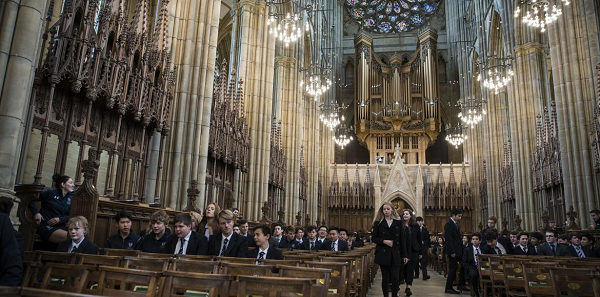

Lancing College is an independent boarding and day school founded in 1848 by Nathaniel Woodard. The school is based in 550 acres (2.2 km2) of countryside in West Sussex, east of Worthing near the village of Lancing, on the south coast of England. Lancing educates c. 550 pupils between the ages of 13 and 18; the co-educational ratio is c. 60:40 boys to girls.
The college is situated on a hill which is part of the South Downs, and the campus dominates the local landscape. The college overlooks the River Adur and the Ladywell Stream, a holy well or sacred stream within the College grounds has pre-Christian significance. Woodard's aim was to provide education "based on sound principle and sound knowledge, firmly grounded in the Christian faith." Lancing was the first of a family of more than 30 schools founded by Woodard (others include Hurstpierpoint College, Ardingly College, Bloxham School and Worksop College).
Roughly 65% of pupils are boarders, at a cost of £32,910 per year; c. 35% are day pupils, at a cost of £23,130 per year. Occasional overnight stays are available to day pupils at an additional cost.
The school is a member of the Headmasters' and Headmistresses' Conference. Girls were first admitted in 1970. The school is dominated by a Gothic revival chapel, and follows a high church Anglican tradition. The College of St Mary and St Nicolas (as it was originally known) in Shoreham-by-Sea was intended for the sons of upper middle classes and professional men; in time this became Lancing College, moving to its present site in 1857.
The school's buildings of the 1850s were designed by the architect Richard Cromwell Carpenter, with later ones by John William Simpson.
In 1998 Lancing commissioned the choral piece Triodion to mark its 150th anniversary. In 2003 it was one of fifty of the country's leading independent schools which were found guilty of running an illegal price-fixing cartel which had allowed them to drive up fees for thousands of parents, although the schools made clear that they had not realised that the change to the law (which had happened only a few months earlier) about the sharing of information had subsequently made it an offence. Each school was required to pay a nominal penalty of £10,000 and all agreed to make ex-gratia payments totalling three million pounds into a trust designed to benefit pupils who attended the schools during the period in respect of which fee information was shared. Jean Scott, the head of the Independent Schools Council, said that independent schools had always been exempt from anti-cartel rules applied to business, were following a long-established procedure in sharing the information with each other, and that they were unaware of the change to the law (on which they had not been consulted).
